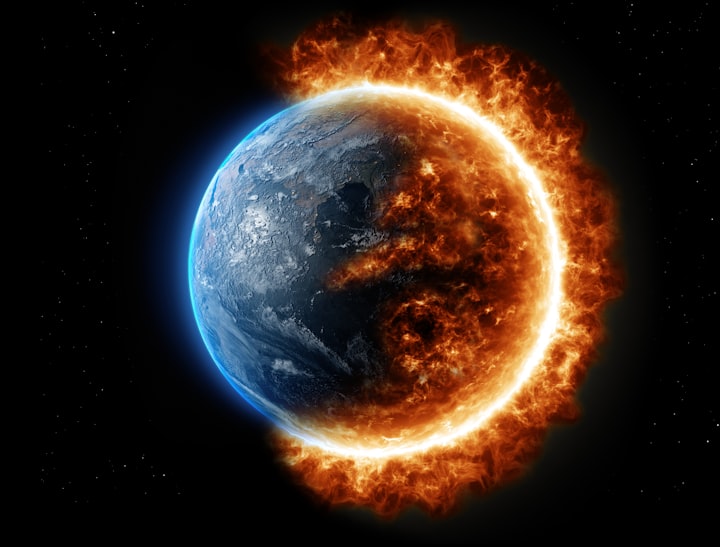The Unsettling Reality
Understanding How the World's Climate is Changing - Insights from the IPCC Sixth Assessment

Title: The Unsettling Reality: Understanding How the World's Climate is Changing - Insights from the IPCC Sixth Assessment
The release of the Intergovernmental Panel on Climate Change's (IPCC) sixth assessment report has sent shockwaves across the globe, serving as an urgent reminder that the world's climate is changing at an alarming rate. This comprehensive report, compiled by leading scientists and experts, paints a stark picture of the current state of our planet and highlights the urgent need for immediate and sustained action to mitigate the worst effects of climate change.This is an unsettling reality of todays world climate.
Key Findings of the IPCC Sixth Assessment
1. **Warming of the Planet**: The report unequivocally confirms that the Earth's climate is warming rapidly. Since the pre-industrial era, global temperatures have risen by approximately 1.1 degrees Celsius. This warming is primarily driven by the increase in greenhouse gas emissions, primarily carbon dioxide (CO2), methane (CH4), and nitrous oxide (N2O), from human activities such as burning fossil fuels, deforestation, and industrial processes.
2. **Extreme Weather Events**: The frequency and intensity of extreme weather events, including heatwaves, hurricanes, floods, and wildfires, are on the rise due to climate change. The report warns that these events will continue to become more frequent and severe, posing a grave threat to communities, ecosystems, and economies.
3. **Melting Ice and Rising Sea Levels**: The melting of polar ice caps and glaciers, along with the thermal expansion of seawater, is causing sea levels to rise. Coastal communities are at risk of inundation, and millions of people around the world could be displaced in the coming decades if urgent action is not taken.
4. **Ecosystems Under Threat**: The report highlights the devastating impact of climate change on ecosystems and biodiversity. Rising temperatures, ocean acidification, and habitat loss are endangering countless species, leading to disruptions in food chains and ecosystems that humans rely on for their survival.
5. **Human Influence**: The IPCC's findings leave no room for doubt: human activities are the dominant cause of the observed climate changes. Urgent and substantial reductions in greenhouse gas emissions are necessary to limit further warming and prevent catastrophic consequences.
The Urgent Need for Action
The IPCC's sixth assessment report serves as a sobering wake-up call to individuals, communities, governments, and industries around the world. It underscores the urgency of addressing climate change on a global scale, as the impacts are already being felt by millions of people.
1. **Emissions Reduction**: The report emphasizes that to limit global warming to 1.5 degrees Celsius, which is the aspirational target of the Paris Agreement, drastic reductions in greenhouse gas emissions are required. This involves transitioning to renewable energy sources, improving energy efficiency, and implementing policies that encourage sustainable practices.
2. **Adaptation and Resilience**: In addition to emissions reductions, adaptation and resilience measures are crucial. Communities must prepare for the impacts of climate change, including investing in infrastructure that can withstand extreme weather events and rising sea levels.
3. **Protecting Biodiversity**: Conservation efforts and the preservation of natural habitats are essential to mitigate the loss of biodiversity. Restoring and protecting ecosystems can help in the fight against climate change and provide crucial resources for future generations.
4. **Global Collaboration**: Climate change is a global challenge that requires international cooperation. Countries must come together to set ambitious emission reduction targets, share technological advancements, and provide support to vulnerable nations.
Conclusion
The IPCC's sixth assessment report is a stark reminder of the urgent need for action to address the rapidly changing climate. The consequences of inaction are dire, affecting not only the environment but also human health, economies, and the well-being of future generations.
While the challenges are immense, the report also highlights the opportunities for positive change. By embracing sustainable practices, transitioning to clean energy sources, and working together on a global scale, we can still limit the most catastrophic impacts of climate change.
It is imperative that individuals, communities, businesses, and governments take the findings of the IPCC report seriously and act swiftly to safeguard our planet for generations to come. The time for action is now, and it is a collective responsibility we all share.





Comments
There are no comments for this story
Be the first to respond and start the conversation.